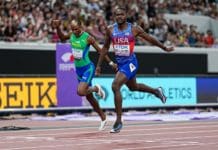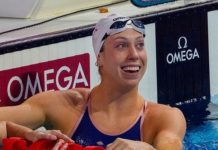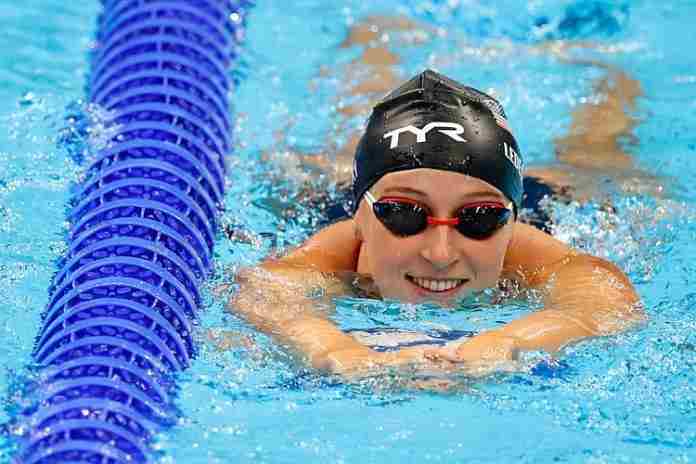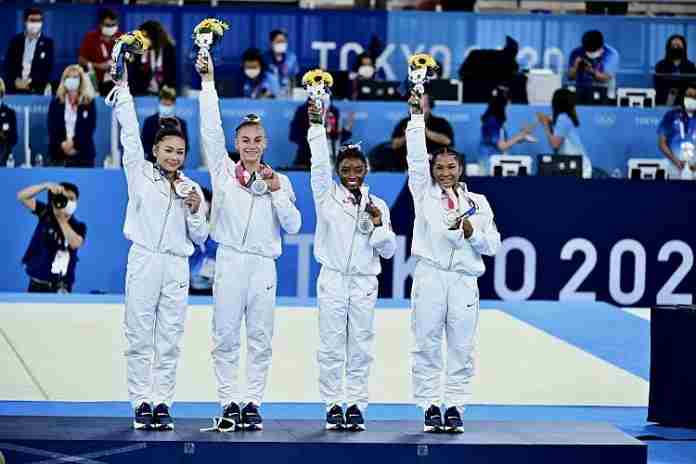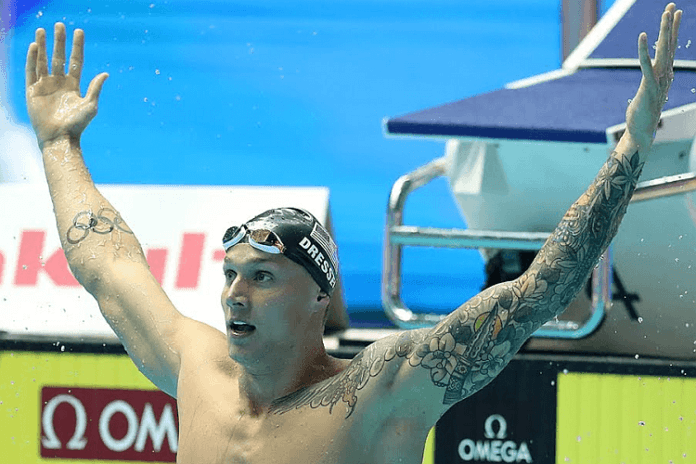(★ Friends: Beautiful! Now 44 donors, who have covered 56% of our current server & support bill. If you like this coverage, please donate here. Your help is so very much appreciated. Thank you. ★)
= TOKYO 2020 =
From Lane One
The Tokyo Games are continuing despite the doom-and-gloom reporting in Japan over the coronavirus, with tremendous Japanese television ratings and excitement in places like Bermuda, the Philippines and Fiji over rare gold medals on the international stage.
And in Russia, the official media has been over the moon about the solid performances of the Russian Olympic Committee team.
But this has not been a joyous Games for the U.S. so far, as icons like Katie Ledecky, Simone Biles and the men’s basketball team having less success than hoped for. And Biles, who was very public in saying the postponement of the Tokyo Games by a year was not something she was happy about, sent shock waves across the country by withdrawing during the Team final.
USA Gymnastics tweeted a statement early this morning that included:
“After further medical evaluation, Simone Biles has withdrawn from the final individual all-around competition in order to focus on her mental health. Simone will continue to be evaluated daily to determine whether or not to participate in next week’s individual event finals. Jade Carey, who had the ninth-highest score in qualifications, will participate in her place in the all-around.”
“We wholeheartedly support Simone’s decision and applaud her bravery in prioritizing her well-being. Her courage shows, yet again, why she is a role model for so many.”
When Biles pulled out of the team competition after the Vault, Jordan Chiles was rushed in as a replacement on Bars. She told NBC’s Maria Taylor afterwards:
“I was shocked, I was overwhelmed. After [Biles] did her vault, [coach] Cecile [Canqueteau-Landi] had came up to me and was like, ‘Jordan, put your grips on.’ I was in so much shock that I didn’t know if she was being serious or not, so I was putting my grips on and I was just like, ‘What am I doing?’”
She knew exactly what to do and scored an impressive 14.166.
Biles’s mental-health issues and what should be done about similar issues for every American will echo for decades, having come on such a huge stage. Coincidentally, the International Olympic Committee had scheduled a news conference with IOC Member and former Olympic swimming champ Kirsty Coventry (ZIM) to speak about the mental-health tools that the IOC has developed and made available in Tokyo, both in-person and online.
But there is also a question which is not being talked about as much, with Biles receiving so much support. That’s what her withdrawal and its timing meant to her teammates, who were still on the floor and trying to compete.
Their fortitude, poise and competitiveness was outstanding. What responsibility does an athlete have to teammates?
Consider this: if Biles had withdrawn before the competition, and the U.S. had been able to petition to allow Carey or MyKayla Skinner to compete in her stead due to her medical situation:
(1) Russia won the women’s gold with 169.528 points, to 166.096 for the U.S., a different of 3.432 points.
(2) Biles scored 13.766 on her vault, well below her usual standards, but still remarkable under the conditions we know now. Chiles, filling in, was excellent on Bars (14.166) and Beam (13.433), but scored only 11.700 on Floor.
(3) If Carey – now in the All-Around to replace Biles – had been substituted for Biles prior to the competition, consider her qualifying scores of 15.166 on the Vault and 14.100 on Floor, her specialties. That would have upped the U.S. score by 3.800, enough to give the American women the gold medal.
(4) If Skinner – 11th in the qualifying – had replaced Biles, she scored 14.933 on Vault and 13.566 on Floor in qualifying. That would have added 3.033 and brought the U.S. to 169.129, close enough to put a lot more pressure on the Russians.
It is true that Carey’s ability to be substituted is clouded by her qualification as an individual gymnast rather than through the team, but an emergency petition on medical grounds could have let her in. Skinner could certainly have been substituted for Biles.
If Biles was not ready to go and she knew it before the competition started, what is her responsibility to her teammates? This question will also be debated, because Chiles, Suni Lee and Grace McCallum are also involved in this situation and they must be remembered as well.
And if winning gold instead of silver doesn’t matter, then why is the U.S. competing at all? Or sending a team based on citizenship and social justice?
Along with the U.S. Olympic & Paralympic Committee, the Commission on the Study of the U.S. Olympics and Paralympics, set to meet beginning in the fall, will no doubt have to consider this question and its ramifications for the Paris team in 2024.
¶
We’re moving along now, with the Tokyo Games having completed 95 events out of 339 (28%); the medal leaders:
1. United States, 31 (11-11-9)
2. China, 27 (12-6-9)
3. Russian Olympic Committee, 23 (7-10-6)
4. Japan, 22 (13-4-5)
5. Australia, 16 (6-1-9) and Great Britain, 16 (5-6-5)
Our exclusive TSX team scoring uses the familiar collegiate system of 10-8-6-5-4-3-2-1 per event to give a much better view of the relative achievements of the teams:
1. United States, 361.5
2. China, 279
3. Japan, 248.5
4. Russian Olympic Committee, 244
5. Great Britain, 207
6. Italy, 197
7. Australia, 149.5
8. Netherlands, 147
9. France, 139.5
10. Germany, 124
11. Korea, 123
12. Canada, 101.5
Japan is having a fabulous Games and so is the Russian Olympic Committee, although its relative standing will be challenged by having only 10 athletes in track & field as per the sanctions laid down by World Athletics.
¶
NBC’s total primetime audience continues steady, and way up over its Opening Ceremony audience from last week:
● 23 July (Fri): 8.2 million for the Opening Ceremony
● 24 July (Sat): 15.3 million
● 25 July (Sun): 19.2 million
● 26 July (Mon): 16.8 million
These numbers are for primetime programming across NBC-NBCSN-CNBC-USA Network, but are still far behind Rio in 2016 (when events were live in U.S. time zones).
~ Rich Perelman
= RESULTS: WEDNESDAY, 28 JULY =
● 3×3 Basketball: Men and Women
The U.S. women won the inaugural Olympic women’s 3×3 tournament with tight victories over France in the semifinals by 18-16 and then 18-15 over the Russian Olympic Committee in the final.
Against France, the U.S. had a 10-6 lead, but the game tightened to 12-11 and a few free throws sent the U.S. to the final. Kelsey Plum and Alisha Gray both had six points. Russia stomped China, 21-14 in the other semi.
In the final, the U.S. ran off to a 6-1 lead and was up, 12-5 with 3:53 to go. Russia closed to 12-9 and 17-14 with 44 seconds left, but it was not enough and the U.S. had an 18-15 win and the gold medal. Stefanie Dolson led the U.S. with seven points on 3-5 from the field and 4-6 on free throws. Plum had five points, on 5-8 from the field. Russia’s top scorer was Anastasiia Logunova with six.
China defeated France, 16-14, in the bronze-medal game.
In the men’s semis, the Russian Olympic Committee sailed past Serbia, 21-10 and Latvia cruised over Belgium, 21-8. The final was tied, 13-13, with 3:44 to play, then at 14, at 15,at 16 and 18-18 with 1:22 to go. A shot by Nauris Miezis gave Latvia a one-point lead, followed by two Russian turnovers and finally a two-pointer from Karlis Lasmanis with 28 seconds to play sealed it for Latvia, 21-18.
Lasmanis led all scorers with 10 and Miezis had seven for Latvia; Ilia Karpenkov led Russia with seven. The game was played at a high level: Russia shot 67% from the field and the Latvians shot 65%.
● Cycling: Road Time Trials
It’s not the Tour de France, that’s for sure, but Slovenia’s Primoz Roglic – denied his shot at the Tour due to injuries from the crash-filled opening days – has an Olympic gold medal instead.
Starting 33rd out of 39, Roglic handled the two-lap, 44.2 km course – with two major climbs – flawlessly and took the lead from former Giro d’Italia winner Tom Dumoulin (NED) at 55:04.19. Then he had to wait.
But no one could better his time, or Dumoulin’s for that matter. Australia’s Rohan Dennis, starting 35th, came closest at 56:08.09 and settled for bronze. Italy’s World Champion, Filippo Ganna, was the last man on the list, but he managed a fifth-place 56:09.93.
Roglic’s winning margin was an impressive 1:39 and underscores his status as one of the world’s top riders … again.
There was an ugly incident alongside the race, as television cameras picked up German Cycling Union sports director Patrick Moster shouting at Niklas Arndt to – in German – “Get the camel riders! Get the camel riders! Come on!” as Arndt closed in on an Algerian and an Eritrean rider.
The German commentator apologized for the comments, Moster apologized afterwards and the German Olympic Committee commended the apology and said it would be speaking with Moster about the situation. Arndt finished 19th.
¶
The women’s time trial was a one-lap, 22.1 km test with one major climb, and no contest.
Dutch star and two-time World Time Trial Champion Annemiek van Vleuten was so far behind Austria’s Anna Kisenhofer in the women’s Road Race that she raised her arms in victory when she crossed the line, only to be informed that she was second.
This time, she left no doubt, taking the lead as the 20th rider out of 25 and then watching as no one came close to her time of 30:13.49. Swiss Marlen Reusser was the closest, but still 56.47 seconds behind at 31:09.96.
Dutch teammate Anna van der Breggen – the 2020 World Champion in this event – was the final rider, but crossed in 31:15.12, winning the bronze medal. Amber Neben, now 46 and a two-time World Champion, was the top American in fifth.
● Diving: Men’s 3 m Synchro
No slip-ups this time, as China’s Zongyuan Wang and Siyi Xie had the top scores on five of the six dines – and second on the other – and won with 467.82 points. China has now won four of the six editions of this event in the Games.
For the second straight Games, the U.S. claimed the silver medal, again with Michael Hixon. Teaming with Andrew Capobianco this time, they started poorly, ranking fifth and sixth on their first two dives. But they zoomed up after finishing with dives ranked 2-2-1-3 and claimed the silver medal at 444.36, way ahead of the rest of the field.
Germany’s Patrick Hausding and Lars Rudiger won the bronze (404.73) while defending champs Great Britain finished seventh.
● Equestrian: Dressage
The standings were absolutely clear: Germany’s Jessica von Bredow-Wrendl ranked first on both technical and artistic merit and won the gold medal aboard TSF Dalera at 91.732.
German star Isabell Werth was second in technical and artistic and won her fifth Olympic medal (1-4-0) aboard Bella Rose, scoring 89.657.
Two-time defending champion Charlotte Dujardin (GBR), ranked only 109th after sparse activity, scored third on technical and artistic (88.543) and won the bronze aboard Gio. Only Dane Cathrine Dufour was close to the stars (87.507) and Sabine Schut-Kerry was fifth for the U.S. (84.300).
Von Bredow-Wendl is 35 and noting that Werth is still at the top of her game at 52, she could be a gold-medal contender for many Games to come.
● Fencing: Men’s Team Sabre
Korea won in 2012, the last time this event was on the Olympic program. And with the Koreans also the 2019 World Champions, it was not a surprise to see them in the final once again.
Even against an excellent Italian squad, Bon-Gil Gu, Jung-Hwan Kim and Seng-Uk Oh had no trouble at all, winning seven of the nine matches, with one tie, and a 45-26 final score.
Gu repeats as a gold medalist, nine years apart. Kim added a gold to go with his individual bronze. Hungary, with Tokyo individual winner Aron Szilagyi, defeated Germany, 45-40, for the bronze medal.
● Gymnastics: Men’s All-Around
Japan had the highest score in the team qualifying, but Russia won the team gold. Japan’s Daiki Hashimoto led the qualifying and was determined not to suffer the same fate and took care of business to claim Japan’s third straight individual gold medal in this event at 88.465.
Hashimoto was excellent throughout, winning on Floor (14.833), Pommel Horse (15.166) and High Bar (14.933), was equal-second on Vault (14.700), and third on Parallel Bars (15.300).
He was chased throughout by China’s 2017 World champ Ruoteng Xiao (88.065) and Russian Nikita Nagornyy (88.031), the star of the team final. Nagornyy posted the best scores on Rings (14.666), Vault (14.900, tied with China’s Wei Sun) and Parallel Bars (15.400).
Brody Malone was the top American in 10th (84.465) and Sam Mikulak, in his third Olympics, finished 12th (83.164).
● Judo: Women’s 70 kg and Men’s 90 kg
Japan won its second women’s gold of the Games and its second straight gold at 70 kg with an impressive performance by 2017 and 2018 World Champion Chizuru Arai. She won three straight matches by ippon and then finished off Austrian finalist Michaela Polleres by waza-ari in four minutes for the gold medal.
Polleres, a 2021 World Championships bronze winner, won four straight matches by waza-ari herself to get to the gold-medal match, including wins over 2021 World Champion Barbara Matic (CRO) and bronze medalist Sanne van Dijke (NED)!
Van Dijke won one of the bronze medals by defeating Giovanna Scoccimarro (GER) and the other bronze went to Madina Taimazova, who defeated Matic.
However, Japan will not sweep the men’s division, as Lasha Bekauri (GEO) claimed the gold medal at 90 kg, defeating Eduard Trippel (GER) by waza-ari in 4:00.
Bekauri, 21, was only noticed earlier this year when he won the European Championship in this class, having no prior placements at the World Championships. But he is Olympic Champion now.
Hungary’s Krisztian Toth defeated Russian Mikhail Igolnikov for one bronze and Davlat Bobonov won the other bronze over Mihael Zgank (TUR).
● Rowing: Men’s Double Sculls-Quadruple Sculls-Fours
In the men’s Double Sculls, France’s Hugo Boucheron and Matthieu Androdias won semifinal one with the second-fastest time of the day, but that was only a warm-up. In the final, they dueled with the fastest semfinalists – Melvin Twellaar and Stef Broenink (NED) – stroke for stroke and finally won by 6:00.33-6:00.53 after 2,000 m, an Olympic best for time.
China, with 2019 World Champions Zhiyu Liu and Liang Zhang on board, were a clear third in 6:03.63.
The men’s Quadruple Sculls, the Netherlands, the reigning World Champions, set a world best in winning gold in 5:32.03, ahead of Great Britain (5:33.75) and Australia (5:33.97). It’s the first Olympic win for the Netherlands in this event and only its second medal.
The men’s Fours saw Australia move up to the top of the podium after winning silver medals in 2008-12-16. Alexander Hill was the only one of those three silver-medal teams to row this time and he has an Olympic gold medal now.
The Aussies set an Olympic-best time of 5:42.76 and needed it to stay ahead of Romania (5:43.13) and Italy (5:43.60). The U.S. finished fifth.
● Rowing: Women’s Double Sculls-Quadruple Sculls-Fours
In the Double Sculls, Romania’s Nicoleta Ancuta-Bodnar and Simona Radis reversed the results of the 2019 World Championships, setting an Olympic Best of 6:41.03 to edge New Zealand, this time with Brooke Donoghue and Hannah Osborne (6:44.82). The Netherlands grabbed third (6:45.73) and the U.S. duo of Kristina Wagner and Gevvie Stone finished fifth (6:52.98).
China, the 2019 World Champions, won the Quadruple Sculls with a world-best time of 6:05.13, easily defeating Poland (6:11.36) and Australia (6:12.08). The Chinese fielded the same line-up for both – Yunxia Chen, Ling Zhang, Yang Lyu and Xiaotong Cui – and confirmed their place as the fastest ever.
The women’s Four was held for the second time in Olympic history – also in 1992 – and 2019 World Champions Australia were the class of the field again, winning with an Olympic Best of 6:15.37. That was only 0.34 better than the Netherlands, the 2019 Worlds silver winners, but the medals were the same. Ireland, fourth at the 2019 Worlds, improved to stand on the podium in third at 6:20.46.
● Rugby Sevens: Men
Fiji won the inaugural tournament in Rio by 43-7 over Great Britain in the final, and made it two in a row in Tokyo, defeating New Zealand by 27-12.
New Zealand, Fiji and South Africa all finished group play with 3-0 records and advanced to the quarterfinals. There, New Zealand sped by Canada, 21-10 and the U.S. lost to Great Britain, 26-21, after having a 21-0 lead! Argentina ousted South Africa, 19-14 and Fiji shut down Australia, 19-0.
In the semis, New Zealand sailed past Britain, 29-7 and Fiji out-scored Argentina by 26-14.
The final saw Fiji get off to a 12-0 lead and 19-12 at half, then score the only points of the second half for a 27-12 final score. The wild celebration in tiny Fiji after the gold-medal win is something the International Olympic Committee will point to as a reason for having Rugby Sevens in the Games.
Argentina won the bronze medal with a tight, 17-12 win over Great Britain.
● Swimming: Women’s 200 m Free-1,500 m Free-200 m Medley
In a near replay of her race in the 400 m Free, Australia’s Ariarne Titmus tracked down Hong Kong’s Siobhan Haughey in the final 30 meters to win the 200 m Free by 0.42 in an Olympic Record of 1:53.50, the no. 3 performance in history. She’s the first Australian to win this event since 2000.
Haughey led at the final turn by 0.47 over China’s Junxuan Yang, but Titmus moved quickly from third to right beside Haughey and moved fastest to the finish. Behind them, Canada’s Penny Oleksiak – the 2016 co-winner of the 100 m Free – was charging in the final 25 m and got the bronze medal in 1:54.70, ahead of Yang (1:55.01).
Defending champion Katie Ledecky of the U.S. was never a factor, seventh after the first lap and then locked into fifth, where she finished in 1:55.21.
¶
The first Olympic appearance of the women’s 1,500 m was the showcase everyone expected from Ledecky, who took command of the race immediately and was up by almost two seconds by the 400 m mark.
She was up by almost three seconds at the half, but it appeared that Sarah Kohler (GER), Simone Quadarella (ITA) and Jianjiahe Wang (CHN) might have a shot at regaining contact. But Ledecky was up by four seconds at the 1,100 m mark and Ledecky was on her way to a sixth Olympic gold.
American Erica Sullivan moved up to fourth by 1,150 m and dueled with Kohler was third by the 1,250 m split and she and Kohler were dueling on opposite sides of the pool. Sullivan took over from Kohler by 1,350 m and actually started gaining on Ledecky with two laps remaining.
Ledecky finished in 15:37.34 – an Olympic Record and the no. 12 performance in history – and was both emotional at the finish of a very long day and thrilled for Sullivan’s brilliant silver-medal performance in 15:41.41, now no. 5 all-time.
Kohler was third in 15:42.91, now no. 8 all-time, finishing ahead of Wang (15:46.37) and Quadarella (15:53.97).
¶
Japan’s Yui Ohashi already had the gold in hand from the 400 m Medley, but was in a fight with Americans Alex Walsh and Kate Douglass – both from the University of Virginia – and came away with her second Olympic title of the Games.
China’s Yiting Yu had the early lead, but Ohashi moved up to second as Walsh took the lead on the Breaststroke leg and turned for home first. The two were close for almost the entire final length, with Ohashi edging ahead in the final 10 m to touch in 2:08.52 to 2:08.65 for Walsh.
Douglass was fourth at the turn and passed Abbie Wood (GBR) to grab the bronze at 2:09.04. Defending Olympic champ Katinka Hosszu finished seventh (2:12.38).
The U.S. has won a medal in this event in six straight Games now and it’s the first time for two medals in a single Games since 1984 in Los Angeles.
● Swimming: Men’s 200 m Butterfly-4×200 m Free
South Africa’s London 2012 gold medalist Chad le Clos took off as usual, leading at the 100 m mark, but then the world-record holder, Hungary’s Kristof Milak took over.
He had the race in hand for the last 80 m, finishing in an Olympic Record of 1:51.25, the no. 3 time in history – he now owns the top four. The record he erased belonged to Michael Phelps from 2008.
Behind him was a mad scramble for the wall, with Federico Burdisso (ITA) moving into second at the final turn, but fading in lane six while Japan’s Tornoru Honda came on in the final strokes to get silver in 1:53.73, making him no. 11 all-time. Burdisso got the bronze in 1:54.45.
Le Clos finished fifth (1:54.93) and American Gunnar Bentz was seventh (1:55.46).
¶
Great Britain was the heavy favorite in the men’s 4×200 m relay and delivered with a brilliant 6:58.58 victory, the no. 3 performance in history.
American Kieran Smith actually had the lead after the first leg, timing a lifetime best of 1:44.74, no. 5 in the world this year, just ahead of 200 m Free winner Tom Dean. But veteran James Guy gave the Brits the lead and they never relinquished it. Guy split 1:44.40, but Drew Kibler of the U.S. (1:45.51) was right with him into the third leg.
Then the race changed, with Matthew Richards swimming an unexpected 1:45.01 and American Zach Apple – so good on the 4×100 m Free anchor – fading to fifth on his final lap. (1:47.31).
At that point, the race was decided for Great Britain, with Duncan Scott finishing in 1:43.45 – fastest of the race – and while Townley Haas was game (1:44.87), he brought the U.S. up fourth in 7:02.43. Russia was second in 7:01.81 (equal-11th all-time) with Australia third in 7:01.84 (Thomas Neill, 1:44.74 on anchor).
It was Britain’s first win in this race since 1908. For the U.S., it is the first time it has failed to win a medal in this event in a Games which it competed: it had not won a medal only in the boycotted Games of 1980.
● Weightlifting: Men’s 73 kg
China’s Zhiyong Shi entered as the two-time defending World Champion and the world-record holder. He left as Olympic champ, with another record.
Shi set an Olympic Record of 166 kg in the Snatch, then made his final Clean & Jerk lift of 198 kg – another Olympic Record – for a total of 364 kg, setting his own world record higher and giving China all three men’s Olympic golds handed out so far.
Behind him, Venezuela’s Julio Mayora made five of his six lifts and totaled 346 kg for the silver medal. Competing in Group A for lower-ranked lifters, Indonesia’s Rahmat Andullah won the bronze, lifting 342 kg, one ahead of Albania’s Briken Calja.
American Clarence Cummings Jr., 21, was only able to complete one of his Snatch lifts (145 kg), cleared his opening Clean & Jerk of 180 kg and then went for the bronze medal, trying 198 kg n his final lift, only to miss and end up ninth at 325 kg. His attitude shows his future is bright.
Elsewhere:
● Team/Basketball: In Group A, the U.S. men crushed Iran, 120-66, taking a 28-12 first-quarter lead and never looking back. Damian Lillard led the U.S. with 21 points. The U.S., with a 1-1 record, needs to beat the Czech Republic on the 31st to be sure of advancing to the quarterfinals. The Czechs have thus far beated Iran by 84-78 and lost to France (2-0) by 97-77.
In Group B, Australia is 2-0 after beating Italy (1-1) by 86-83. Germany defeated Nigeria by 99-92 and is 1-1, while Nigeria fell to 0-2 and must beat Italy to have a chance to advance.
● Team/Beach Volleyball: The patched-up team of Jake Gibb and replacement player Tri Bourne moved to 2-0 in Pool C after defeating the Swiss pair of Adrian Heidrich and Mirco Gerson, 21-19, 23-21. They will play the mighty Qatari pair of Cherif Younousse and Ahmed Tijan for the group title on the 30th; both are assured of moving on to the round of 16.
● Team/Football: In the men’s tournament, Japan finished Group A at 3-0, slamming France by 4-0 on Tuesday and finishing with a 7-1 goals-against total, Mexico was 2-1 in the group and also advances.
South Korea (2-1) won Group B, Spain (1-0-2) and Egypt (1-1-1) advanced out of Group C and Brazil (2-0-1) won Group D after a 3-1 win over Saudi Arabia. Richarlison scored twice and is the tournament leader with five goals.
● Team/Volleyball: the U.S. men moved to 2-1 in Pool B with a 3-1 win over Tunisia on Wednesday. Russia is still undefeated in the six-team pool at 3-0; the U.S. will have a major test against Brazil (also 2-1) on the 30th.
● Team/Water Polo: The U.S. women suffered a stunning loss to Hungary in Group B play, 10-9, losing an 8-6 lead at the end of the third quarter. Maddie Musselman scored three times for the U.S., but it broke a 21-game win streak for the American women.
In the five-team group, the U.S. is still well positioned to advance at 2-1 with a game remaining against the 1-1 Russian Olympic Committee on the 30th. Hungary has games remaining against Japan and China, with the top four teams in the group advancing to the playoffs.
= PREVIEWS: WEDNESDAY, 28 JULY =
(17 events across 8 sports)
● Canoeing: Women’s Slalom C-1
This is the debut for this event in the Olympic Games, after the K-1 was introduced in 1972 and then for good in 1992. Once again the favorite is Australia’s Jessica Fox, the two-time bronze medal winner in the K-1 and the C-1 World Champion in 2013-14-15-18, but silver medalist in 2019 and bronze medalist in 2020. She’s not invincible, but the clear favorite.
Top challengers include 2019 World Champion Andrea Herzog (GER) and bronze medalist Nadine Weratschnig (AUT), the 2017 World Champion Mallory Franklin (GBR), silver medalist Tereza Fiserova (CZE) and bronze medalist Ana Satila (BRA), all capable of winning.
American hopes are on 17-year-old Evy Leibfarth, fourth in the World Championships in this event in 2019 and a two-time World Cup medal winner.
● Fencing: Women’s Team Foil
The fencing world is still buzzing about American Lee Kiefer’s upset of Rio winner and three-time World Champion Inna Deriglazova in the Foil final, but both will be back in search of medals in the team event.
Deriglazova also has three World Team titles in 2011-16-19 and won an Olympic silver in 2012 as a member of the Russian team. She will have Adelina Zagidullina and Larisa Korobeynikova with her, both members of the 2019 World Champion team. They start as favorites.
Russia defeated Italy in that final and Arianna Errigo and Alice Volpi are back from that team, adding in Martina Batini; clear contenders for gold. The U.S. was third, and Keifer, Nicole Ross and Jacqueline Dubrovich are all returning. Keifer, Ross and two others won the 2018 World Championships Team title, over Italy (with Errigo and Volpi). This should be great.
Also in the mix: France, led by Ysoara Thibus.
● Gymnastics: Women’s All-Around
With Simone Biles out, it’s also worth noting that she was not at her best in the team qualifying, but still led at 57.731, followed by Brazil’s Rebeca Andrade (57.399), American Suni Lee (57.166) and three Russians: Angelina Melnikova (57.132), Vladislava Urazova (57.099) and Viktoriia Listunova (56.932; can’t compete due to the limit of two per country).
Belgium’s Nina Derwael is better known as the two-time Uneven Bars World Champion, but she impressed in the A-A at 56.598 in seventh. American Jade Carey replaces Biles; she was ninth (56.265) and the third American after Biles and Lee.
Andrade, 22, is the mystery, 11th in the All-Around in Rio in 2016, but also this year’s Pan American Champion. Could she win? In this crazy Games, why not?
The U.S. has won this event four times in a row.
● Judo: Women’s 78 kg and Men’s 100 kg
The women’s half-heavyweight class had been dominated by American Kayla Harrison, who won in both 2012 and 2016. France’s Madeleine Malonga won the 2019 World Championship and was the 2021 runner-up and starts as the favorite. The 2021 World Champion, German Anna-Maria Wagner is also a prime contender and Japan fields the 2018 World Champion and 2019 runner-up Shori Hamada.
Behind them are Worlds medalists such as 2018 silver and 2021 bronze winner Gusje Steenhuis (NED), 2019 bronze winner Loriana Kuka (KOS), 2017 World Champion and 2021 bronze medalist Mayra Aguiar (BRA) and 2017 bronze winner Natalie Powell of Great Britain.
¶
Georgia’s Varlam Liparteliani was the 2017 Worlds 100 kg silver medalist, the 2018 Worlds silver medalist and the 2021 bronze medalist … and is thus no. 1 in the International Judo Federation rankings. But is he the favorite?
Portugal’s Jorge Fonseca has won the world titles in both 2019 and 2021 and is ranked second and leads a parade of possible medalists, starting with Japan’s 2017 World Champion, Aaron Wolf. Serbia’s Aleksandar Kukolj was runner-up to Fonseca in 2021, but is only ranked 28th?
Korea answers with 2018 World Champion Gu-Ham Cho, Russia has 2018 Worlds bronze medalist Niyaz Ilyasov and Mongolia has the other bronze winner, Otgonbaatar Lkhhagvasuren. Dutch star Michael Korrel is ranked third and won bronze at the 2019 Worlds.
Japan has been sensational in the men’s division; can Wolf bring Olympic gold back for the first time since 2000 in this class?
● Rowing: Women’s Pair-Lightweight Double Sculls
Great Britain’s Helen Glover and Heather Stanning have won the last two Olympic titles, but Glover is in Tokyo with Polly Swann now and they finished second to Greece’s Maria Kyridou and Christina Bourmpou, 6:48.70 to 6:49.39, with Canada a close third at 6:39.46.
But the action was in the second semi, with 2017 and 2019 World Champions Grace Pendergast and Kerri Gowler (NZL) finishing in 6:47.41, the fastest time ever! Russia was well back at 6:50.24 and Spain was third (6:50.53), but the Kiwis are obvious favorites to get the country’s first Olympic title in this event.
Greece, Britain and even Canada – with 2019 Worlds bronze winners Caileigh Filmer and Hillary Janssens – are all rowing for silver and bronze.
In the Lightweight women’s Double Sculls, Britain’s Emily Craig and Imogen Grant, who won bronze medals at the 2019 Worlds – won the first semifinal impressively over France, 6:41.99-6:42.92 and the Netherlands, the 2019 Worlds silver medalists (Marieke Keijser and Ilse Paulis: 6:43.85). Paulis teamed with Maaike Head to win in Rio in 2016.
However, the form chart took a beating in semi two, as Valentina Rodini and Federica Cesarini (ITA) won in a world’s best time of 6:41.36, dogged to the finish by Americans Mark Reckford and Michelle Sechser (6:41.54) and Romania (6:42.08).
Can Italy do this twice in a row? This could be one of the tightest races of the regatta.
● Rowing: Men’s Pair-Lightweight Double Sculls
The men’s Pair is expected to be the property of Croatian brothers Martin and Valent Sinkovic, the reigning World Champions, who won their semifinal in 6:15.63. The brothers won Olympic golds in 2016 in the Double Sculls, then changed to Pairs and won world titles in 2018 and 2019.
However, Marius Cozmiuc and Ciprian Tudosa (ROM) – the 2018 Worlds silver medalists – won the first semifinal in a faster 6:13.51, ahead of Denmark (6:14.88) and Spain (6:16.25). Serbia was second in the second semi (6:17.47) with Canada (6:19.15) third.
Looks like another Croat-Romanian showdown for the gold. New Zealand and Australian entries have won the last four Olympic titles.
The men’s Lightweight Double Sculls is an event which World Rowing insists upon in order to give “all rowers” a chance to compete at the Olympic and which the International Olympic Committee would rather do without. But here it is, for a seventh straight Games.
Germany’s Jonathan Rommelmann and Jason Osborne – the 2019 Worlds bronze medalists – won the first semifinal in 6:07.33 and looked like capable challengers, finishing well up on Uruguay (6:11.48) and the Czech Republic (6:11.88) Then came the second semi.
Ireland’s World Champion Paul O’Donovan and Fintan McCarthy overpowered the course and finished in 6:05.33, the world’s best time for this event. They needed to be fast, since 2019 Worlds silver winners Stefano Oppo and Pietro Ruta timed 6:07.70!
That makes the final look a lot like the 2019 Worlds, with Ireland the favorite and Italy and Germany chasing.
● Shooting: Men’s Trap-Women’s Trap
Croatia has dominated men’s Trap with Giovanni Cernogoraz and Josip Glasnovic winning in London and Rio and Glasnovic is back to defend his title.
But the 2004 Olympic Champion is back as well, in Russian Alexey Alipov and 2008 winner David Kostelecky (CZE). Throw in 2018 World Champion Alberto Fernandez (ESP), silver medalist Erik Varga of Slovakia and bronze winner Abdulrahman Al-Faihan of Kuwait and it’s impossible to pick a favorite,
One clue might be from the 2021 ISSF World Cups, with four different winners: Glasnovic in February, Daniele Reca (ITA – not entered) in March, Tatal Alrashidi (KUW) in May and Mauro de Filippis (ITA) in June.
In women’s Trap, Beijing 2008 champion Satu Makela-Nummela (FIN) is back, as is London 2012 winner Jessica Rossi (ITA) and 2008-12 silver medalist Zuzana Stefecekova. It also happens that Stefecekova won the 2018 World Championships.
Rio 2016 Olympic silver medalist Natalie Rooney (NZL) is also back, as is 2018 Worlds runner-up Xiaojing Wang (CHN) and bronzer Silvana Stanco (ITA).
What about trends from the ISSF World Cups? It only muddies the situation, with Fatima Galvez (ESP) winning in February in a shoot-off with Russia’s Daria Semianova; Stefecekova won in March and San Marino’s Alessandra Perilli won a shoot-off with American Madelynn Ann Bernau in May. It’s going to be close.
● Swimming: Women’s 200 m Butterfly-4×200 m Freestyle
Americans Hali Flickinger and Regan Smith went 1-2 in the first semi in 2:06.23 and 2:06.64, ahead of Russian Svetlana Chrimrova (2:08.62). Smith moves to no. 3 on the world list for 2021, Flickinger has already been faster.
China’s favor Yufei Zhang, who came in with the top three times in the world this year, was in semi two and took off from the start and had a body-length lead at halfway. She finished in 2:04.89, the fastest time in the world in 2021 and now no. 10 on the all-time list. Wow!
Behind Zhang came 2019 World Champion Boglarka Kapas (HUN: 2:06.59) and Liyan Yu (CHN: 2:07.04). Zhang is the big favorite, but Flickinger and Smith both have excellent shots at medals.
¶
The women’s 200 m Free results suggest that Australia, Canada and the U.S. should be the medal favorites, with Germany also a possibility. With Ariarne Titmus available, Australia has to be a big favorite with the U.S. a solid silver contender.
The U.S. won this race in the last two Games, with Australia second, but in the 2019 Worlds, Australia beat the U.S. in a world-record 7:41.50, with Canada third and China fourth.
● Swimming: Men’s 100 m Free-800 m Free-200 m Breast
The 2017 and 2019 World Champion, American Caeleb Dressel took his world-leading mark down to 47.23 in the first semifinal, ahead of Alessandro Miressi (47.52) and Soo-Woo Hwang of Korea (47.56).
In the second semi, Russian Kliment Kolesnikov – the 100 m Back silver medalist – turned first and was the clear winner in 47.11, also a new world leader. Defending champion Kyle Chalmers (AUS) was second in 47.80, followed by Nandor Nemeth (HUN: 47.81). American Zach Apple, so great on the 4×100 m Free anchor, was sixth and did not advance.
Kolesnikov’s mark is a Russian record and moved him to no. 8 all-time and has to scare Dressel and everyone else heading into the final.
¶
The 800 m Free for men was added to the program for the first time in Tokyo, with Ukraine’s two-time Worlds 1,500 m medalist Mykhailo Romanchuk leading the qualifying in an Olympic Record of 7:41.28, the fastest time in the world this year and equal-8th all-time. He’s a favorite, not the favorite.
The other contenders are in: German open-water star Florian Wellbrock (qualified 2nd: 7:41.77, no. 2 in 2021 and 11th all-time), Austria’s Felix Auboeck (7:45.73), Australia’s Jack McLoughlin and Italian veteran Gregorio Paltrinieri, the Rio 1,500 m gold medalist and 2019 World Champion in this event.
The no. 3 qualifier was American Robert Finke at 7:42.72, a huge lifetime best and an American Record, moving him into the top 15 of all time. At 21, is there more in the tank to take on these veterans?
¶
In the men’s 200 m Breast, the world-record holder, Russia’s Anton Chupkov, and all-time no. 2, Australia’s Zac Stubblety-Cook were in the second semifinal, but Britain’s James Wilby – a silver medalist in the 2019 Worlds 100 m Breast, led for most of the race. Stubblety-Cook worked his way from fifth at the halfway mark to second at the final turn and won in 2:07.35, equal-seventh on the year.
Finn Matti Mattison was a surprising third at 2:08.22 and Chupkov only fourth at 2:08.54.
That gives hope to Arno Kamminga (NED) and American Nic Fink, who went 1-2 in the first semi, at 2:07.99 and 2:08.00, with Ryuya Mura (JPN) third in 2:08.27.
The year list says Stubblety-Cook, then Chupkov and Kammings, but Fink has a real shot at a medal.
● Table Tennis : Women’s Singles
China has won this event in all eight Games in which it has been contested. It has also won 13 straight World Championships titles … and finalists!
So China’s Meng Chen and Yingsha Sin are favored to get to the final in Tokyo; Singapore’s Mengyu Yu has reached the semifinals against Chen. Sun will play the highly-capable Mima Ito (JPN).
= INTEL REPORT =
It’s not all fun amid the Games in Tokyo, as the International Judo Federation posted this notice after German women’s 63 kg judoka Martyna Trajdos – a 2019 World Championships bronze medalist – was physically shaken and slapped by coach Claudiu Pusa as some sort of an odd pre-match ritual:
“The IJF addressed a serious official warning towards the German coach, concerning the bad behaviour he showed during the competition. Judo is an educational sport and as such cannot tolerate such behaviour, which goes against the judo moral code.”
Trajdos lost the round-of-32 match to Szofi Ozbas (HUN), but said later that the shaking and slapping was only a ritual and not punishment.
¶
The Covid-19 total among Olympic-related personnel increased by 16 on 28 July, but with no athletes involved. Nine contractors, four “Games-concerned personnel” such as coaches and officials, two media and one volunteer were found positive.
That brings the total to 169, with 80 of these contractors, 55 “Games-concerned personnel,” 17 athletes, 11 media and six Tokyo 2020 staff and volunteers.
The testing report by stakeholder group:
● Athletes and team officials: 22 positives out of 124.358 tests through 28 July (0.02%).
● Media/Tokyo 2020 staff: 35 positives out of 150,577 tests through 28 July (0.02%).
In addition, the U.S. Olympic & Paralympic Committee is now publishing positives, with one positive reported among the 1,038 athletes and officials in Tokyo as of 24 July, none among 1,144 on 25 July, none among 1,172 delegates on 26 July, none among 1,175 on 27 July.
¶
The Russian Olympic Committee is filing a protest against Chilean journalist Sebastian Nahmias, according to ROC spokesman Konstantin Vybornov:
“On the whole, we enjoy a very respectful treatment of our national team, but at the same time, we encounter occasional persons who unashamedly provoke us and try to knock our athletes off balance.”
“In the case of [tennis star] Daniil Medvedev, we are talking about Chilean journalist Sebastian Nahmias. He has been trying for the second day in a row to incite a scandal in regard to our team asking over and over again the same questions and in the same manner.
“It has nothing to do with translation problems, everyone understood him quite clearly, and the organizers issued a warning to this strange colleague yesterday and had to walk him away from the mixed zone for the media today. By the way, Medvedev acted in a very dignified manner under unpleasant circumstances.”
Nahmias has claimed that the ROC has “cheated” on its uniforms under the sanctions handed down by the Court of Arbitration for Sport.
You can receive our exclusive TSX Report by e-mail by clicking here. You can also refer a friend by clicking here, and can donate here to keep this site going.
For our 649-event International Sports Calendar for 2021 and beyond, by date and by sport, click here!







